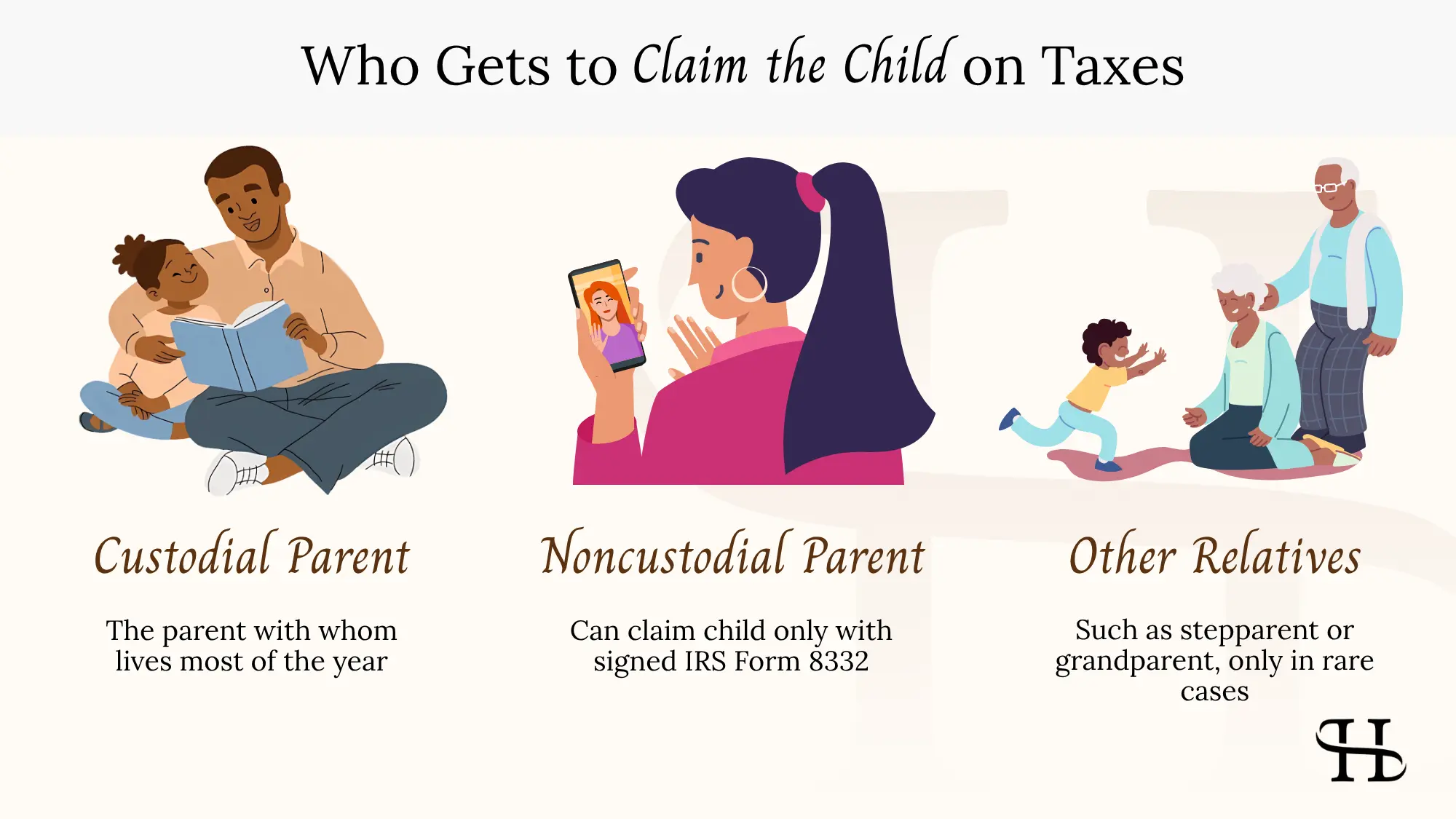When California parents divorce or separate, figuring out who can claim the child on taxes can become complicated and contentious. Even with joint custody and shared expenses, only one parent can legally claim a child as a dependent each year and receive the associated tax benefits. The federal IRS rules apply nationwide, but understanding how California courts and family agreements intersect with those rules is critical when filing taxes after divorce.
Working with a skilled Sacramento child custody lawyer who is California Board-Certified in family law can help ensure your parenting plan clearly addresses tax-related rights and obligations.
Who Can Claim a Child as a Dependent in Shared Custody Cases?
Depending on the custody arrangement and compliance with IRS rules, the following individuals may be eligible to claim the child:
- Custodial parent (the parent with whom the child spends the majority of nights during the year).
- Noncustodial parent, if the custodial parent signs IRS Form 8332 (Release/Revocation of Release of Claim to Exemption for Child by Custodial Parent) or a similar written declaration.
- Stepparent, grandparent, or other relative — but only in rare cases where the child resides with and is primarily supported by that person, and the biological parents do not meet IRS dependency criteria.

The IRS and California’s Franchise Tax Board (FTB) apply similar rules. While federal tax law governs who can claim a child for purposes of tax exemptions and credits, California family courts may assign the right to claim a child to one parent in the divorce decree or custody judgment. That allocation may be tied to custody time, tax fairness, or compliance with child support obligations.
Can Both Parents Claim a Child as a Dependent after Divorce?
No — only one taxpayer may claim a child as a dependent in a given tax year. The IRS defines a qualifying child based on factors such as residency, relationship, age, and financial support, and the dependency exemption cannot be split or shared. As a general rule, the parent with whom the child spends the most overnights during the year is considered the custodial parent and has the right to claim the child — unless a valid agreement or court order states otherwise.
What Happens If More Than One Parent Claims a Child?
If both divorced parents try to claim the same child in the same tax year, the IRS will flag the duplicate claim. The IRS does not allow more than one person to claim the same child on their tax returns. This could result in a rejected return or delay in processing until the conflict is resolved, potentially affecting your tax refund. The IRS may require additional documentation to prove who properly filed the claim. In some cases, an audit or additional documentation may be required.

From a legal standpoint, the most effective way to prevent this situation is to:
- Follow IRS guidelines and maintain accurate files to support your claim.
- Include specific language in your custody or divorce judgment about which parent has the right to claim the child each year.
- Revisit and revise the agreement if custody, support obligations, or income levels change.
- Work with a family law attorney to ensure that any agreement aligns with IRS requirements and can be upheld if challenged.
- If both parents have equal parenting time and no agreement exists, the IRS may award the tax benefit to the parent with the higher adjusted gross income.
Courts can intervene when a non-custodial parent violates the agreement. Our child custody lawyers can help if your co-parent claimed the child in violation of a court order. Improperly claiming a child can lead to legal consequences, and who claims the child depends on IRS rules, court orders, and filed documentation.
Tips for Co‑Parents Navigating 50/50 Custody Tax Claims
Navigating taxes with a 50/50 custody arrangement requires clear legal guidance, not just financial strategy. Below are key legal considerations to discuss with your attorney.
Tip 1: Define the Custodial Parent in Your Court Orders
Even if custody is labeled “joint”, the court must still designate a primary custodial parent for legal and tax purposes. Physical custody — meaning where the child lives or has lived for the majority of the year — often determines which parent can claim the child on taxes. This designation can affect not only tax claims but also eligibility for other benefits and services. For example, only the custodial parent may qualify for Head of Household filing status, which can provide a more favorable tax rate.
Tip 2: Include a Tax Clause in Your Parenting Agreement

Specify who can claim the child for tax purposes and under what conditions. The divorce decree should clearly state which parent has the right to claim the exemption for the child in each current tax year. For example, some parents alternate years or assign the claim based on who provides more financial support. The agreement should be enforceable, and any waiver (such as IRS Form 8332) should be referenced.
Tip 3: Link the Right to Claim the Child to Support Compliance
Family courts in California may tie the right to claim a child as a dependent to the payment of child support, meaning the parent who is required to pay child support may have their right to claim the child for tax purposes affected if they do not pay as ordered, as the court may restrict tax rights based on noncompliance. If a parent falls behind on support, the other parent may be entitled to the exemption, even if the parenting plan originally said otherwise.
Tip 4: Seek Legal Help If Your Agreement Has Gaps
If your current court order is silent or unclear about who gets to claim the child, a custody modification may be necessary. A skilled child custody attorney can help you petition for clarity before tax season becomes a legal headache.
Benefits of Hiring Our Family Law Lawyers
Attempting to resolve tax-related custody issues without legal assistance can result in confusion, conflict, and the loss of benefits. Our experienced California child custody lawyers can:
- Draft or modify parenting plans with clear tax-related terms.
- Advise on how custody designations affect tax claim rights.
- Help enforce court orders when a co-parent violates tax agreements.
- Protect your rights in custody disputes involving support and dependency claims.
- Coordinate with your accountant to align legal and financial strategies.
Whether you’re establishing a custody agreement for the first time or revisiting one due to changing circumstances, our legal team ensures that your parental rights and financial interests are protected.
Contact a Sacramento Child Custody Attorney You Can Trust
Tax season should not be a time of uncertainty or conflict for separated parents. At Hopper Hopper & Strebe, we specialize in helping you gain clarity and peace of mind. If you’re unsure who can claim your dependent child on taxes after a divorce or legal separation — or if your co-parent claimed them without legal authority — reach out to us.
Let our Sacramento child custody attorneys review your court orders, assess your rights, and guide you toward the best legal solution.
Contact our law firm today to schedule your consultation and protect what matters most — your child and your future.





.avif)
.avif)



